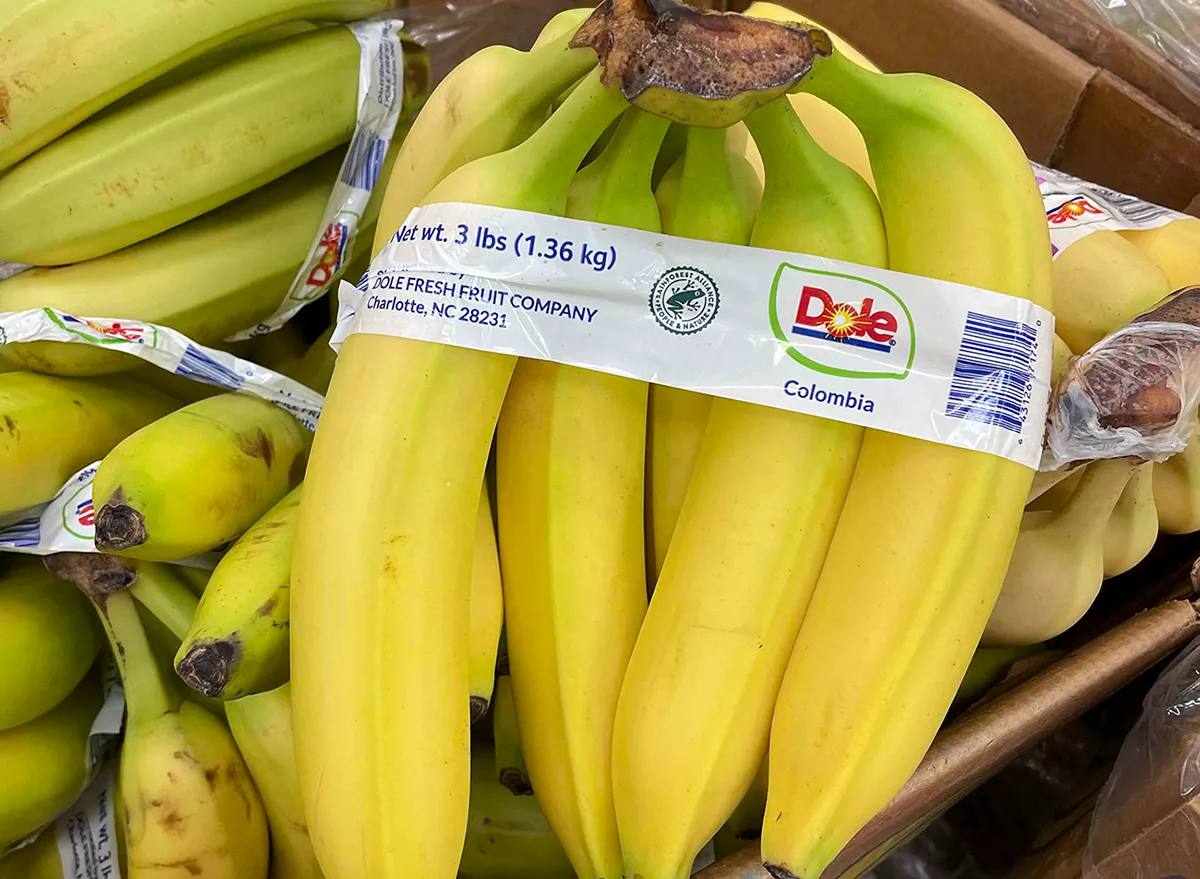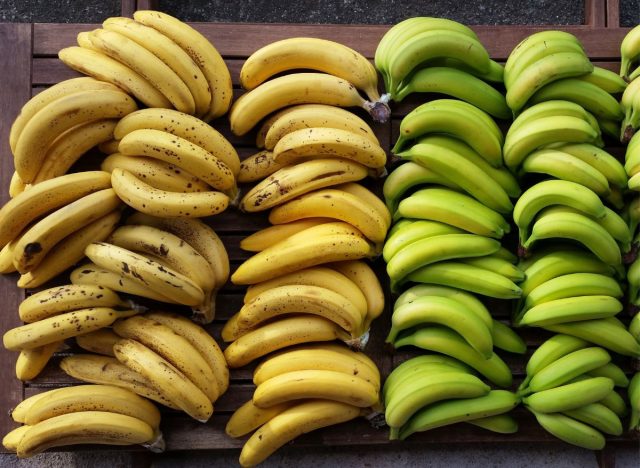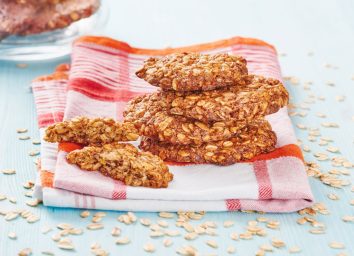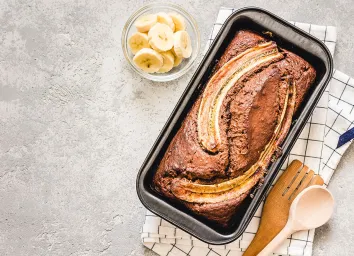11 Science-Backed Benefits of Bananas

If you've ever visited a bodega in New York City (or seen John Mulaney's musical sketch about bodegas on SNL), then you probably know that finding a nutrient-dense snack in these convenient "we carry everything" stores can be a bit challenging, to say the least. But if you're short on time, low on cash, and in need of a quick yet healthy grab-and-go breakfast, one thing you can always count on is the fact that these delis will have an ample supply of fresh, delicious bananas.
Whether you're looking for a satisfying snack or a sweet yet healthy way to boost the nutritional content of your recipes with a dependable quality ingredient, bananas are nutrient-dense golden wonders that can enhance any meal. But how exactly does this tiny tropical fruit help nourish your body while also supporting your health?
To find out more about the science behind bananas' ability to benefit you and your body, we did a little research while also consulting a few experts in nutrition. Read on to learn more about some of the benefits of eating bananas—and for more healthy eating insight into the effects of another nutritious fruit, be sure to check out What Happens to Your Body When You Eat Figs.
A look at a banana's nutrition content

Low in calories, bananas are a fiber-rich fruit that contains a host of key vitamins, minerals, and nutrients. According to the U.S. Department of Agriculture, eating a single, average-sized banana (which they estimate weighs 126 grams) fuels your body with:
- 112 calories
- 1.37 grams of protein
- 0.41 grams of fat
- 28.8 grams of carbohydrates
- 3.28 grams of total dietary fiber
- 15.4 grams of natural sugar
- 1.26 milligrams of sodium
- 11 milligrams of vitamin C
- 6.3 milligrams of calcium
- 0.33 milligrams of iron
- 34 milligrams of magnesium
- 27.7 milligrams of phosphorous
- 0.84 milligrams of niacin
- 451 milligrams of potassium
Eating a banana also nourishes your body with antioxidants that are known to fortify your cells against potentially harmful free radicals, selenium, choline, calcium, vitamin A, folate, vitamin B6, copper, zinc, carotene, vitamin K, and riboflavin.
Are bananas good for you?
Though bananas' nutritional profile is clearly a promising one, to better understand how these golden wonders really impact your overall health and wellness, we turned to nutrition experts and members of our Expert Medical Board, Amy Goodson, MS, RD, CSSD, LD, author of The Sports Nutrition Playbook, and Lauren Manaker, MS, RDN, registered dietitian and author of The First Time Mom's Pregnancy Cookbook and Fueling Male Fertility.
"Bananas can absolutely be a healthy part of a balanced diet," Manaker tells Eat This, Not That! "They are a source of natural carbohydrates, they provide key micronutrients, and they are a source of fiber."
While echoing Manaker's sentiments, Goodson elaborates. "Bananas are a good source of fiber, potassium, and vitamin B6, as well as many antioxidants," she adds. "Fiber is important for overall health, including gut and heart health, and many of us are not meeting the recommended daily targets of 21-25 grams for women and 30–38 grams for men."
How many bananas can you eat a day?
Although Goodson shares that there's no specific recommendation or hard rule about the amount of "bananas or any fruit" you eat, she notes that "the Dietary Guidelines for Americans recommends that you eat 2–4 servings of fruit a day—and a half banana is one serving."
"Most adult Americans are advised to eat 1.5–2.5 servings of fruit every day, depending on a few factors," adds Manaker. "So, the quantity of fruit that people can eat every day depends on how many other fruits they have eaten."
"You can eat two fruit servings by consuming one medium banana!" says Goodson.
What are the benefits of bananas?
Here are 11 science-backed benefits of bananas.
1. Blood pressure regulation
According to some research, one benefit of bananas is that they may help regulate blood pressure levels because they are high in potassium yet low in sodium.
"The potassium found in bananas may be beneficial for heart health and for those who are trying to reduce their blood pressure," says Goodson.
Manaker also notes that potassium is "an important nutrient that supports heart health." In turn, this means eating this tropical treat may help reduce your risk of heart attack and stroke.
2. Blood sugar regulation
Part of bananas' charm and "a-peel" can be traced back to their natural sweetness. Based on their sweet taste, you'd think that they might work against maintaining healthy blood sugar levels. However, research shows that eating bananas can actually be beneficial for your blood sugar.
"Bananas have a low glycemic index, which means they may help regulate blood sugar levels and reduce the risk of type 2 diabetes," Trista Best, MPH, RD, LD, at Balance One Supplements, tells Eat This, Not That!
3. May reduce free radicals
"Bananas, like many other fruits and vegetables, contain antioxidants that are important for combating damage from free radicals," says Goodson. This is significant because "over time, free radicals in the body may build up and lead to chronic inflammation and disease," she explains.
4. Support healthy bowel movements
When you're feeling a bit backed up, healthcare professionals will often recommend bulking up and softening your stool with hefty portions of fiber as a means to get things going again. Fiber-dense bananas can be a golden ticket to healthy, productive bowel movements.
"Pectin, which is a fiber found in both ripe and unripe bananas, may help support healthy bowel habits by softening stools and preventing constipation," says Goodson.
5. Promote digestion and support gut health
In addition to aiding in the excretion of your bodily waste, eating bananas is an excellent nutritional resource for your overall digestive health.
"Bananas are a good source of dietary fiber, which can help promote regularity and aid in digestion," explains Best.
"Unripe bananas can be beneficial for gut health due to their resistant starch content, which is a type of prebiotic fiber that feeds the 'good' bacteria in your gut," says Goodson.
In fact, some research suggests that eating a banana twice a day ahead of meals can even help reduce bloating because of how their potassium content helps to mitigate the retention of fluids in your body while also increasing the amount of bloat-fighting bacteria in your gut's microbiome.
6. Support muscle building & exercise recovery
The power of the potassium in bananas can benefit the body in more ways than one. This electrolyte mineral "breaks up into ions (particles with electrical charges) when it is dissolved in water or body fluids. […] These ions help move nutrients into cells, help move waste out of cells, and help nerves, muscles, the heart, and the brain work the way they should," according to the NIH National Cancer Institute.
"Bananas are an excellent snack for athletes and exercisers because they provide electrolytes that are commonly lost in sweat, which may help to reduce muscle cramps post-workout," explains Goodson.
Research shows that magnesium is a nutrient that can aid in muscle contraction, relaxation, and protein synthesis, which is excellent for building lean muscle mass.
7. Can boost energy & support weight loss
"Bananas contain natural sugars such as glucose, fructose, and sucrose, which can provide a quick boost of energy," says Best.
Additionally, research indicates that the magnesium in bananas may naturally help elevate their energizing abilities because of how this nutrient can support healthy metabolic function while also aiding in lipolysis, a physiological process where your body breaks down fats stores, converting it into energy.
8. May lower heart disease risk
"Bananas are high in potassium, which can help regulate blood pressure and reduce the risk of heart disease," explains Best.
"There is research to support that those of us who eat diets higher in potassium may have lower risk for heart disease," says Goodson. "One medium banana provides you with 10% of your daily value of potassium, so a banana a day may help keep the doctor away!"
"Another mineral that is important for heart health is magnesium," Goodson adds, "and deficiency may even be a contributor to the development of heart disease."
9. Support better sleep & mood
"Bananas contain tryptophan, an amino acid that can help improve mood and reduce symptoms of depression," explains Best.
Along with tryptophan, studies also show a correlation between magnesium consumption and improved mood, cognition, and sleep quality, as well. According to Goodson, "Bananas provide you with 8% of your daily value of magnesium."
10. Reduce inflammation
"Bananas contain compounds, such as catechins and dopamine, which have been shown to have anti-inflammatory effects," says Best.
In fact, one study from PLOS One revealed that bananas' carbohydrate content actually helped to reduce inflammation in cyclists who had biked for nearly 50 miles.
11. May optimize healthy kidney function
In addition to helping with regulating and supporting healthy blood pressure, the potassium found in bananas can play a significant role in keeping your kidneys healthy. Some research suggests that the intake of dietary potassium, which bananas happen to offer in spades, can help reduce your chances of developing chronic kidney disease.
- Source: https://www.dietaryguidelines.gov/resources/2020-2025-dietary-guidelines-online-materials
- Source: https://pubmed.ncbi.nlm.nih.gov/11522739/
- Source: https://www.ncbi.nlm.nih.gov/pmc/articles/PMC7270385/
- Source: https://www.sciencedirect.com/science/article/abs/pii/S1075996411000424
- Source: https://www.ncbi.nlm.nih.gov/pmc/articles/PMC4586582/
- Source: https://www.ncbi.nlm.nih.gov/pmc/articles/PMC6096631/
- Source: https://www.ncbi.nlm.nih.gov/pmc/articles/PMC5490577/
- Source: https://pubmed.ncbi.nlm.nih.gov/24134856/
- Source: https://pubmed.ncbi.nlm.nih.gov/28654669/
- Source: https://pubmed.ncbi.nlm.nih.gov/35184264/
- Source: https://pubmed.ncbi.nlm.nih.gov/30733429/









